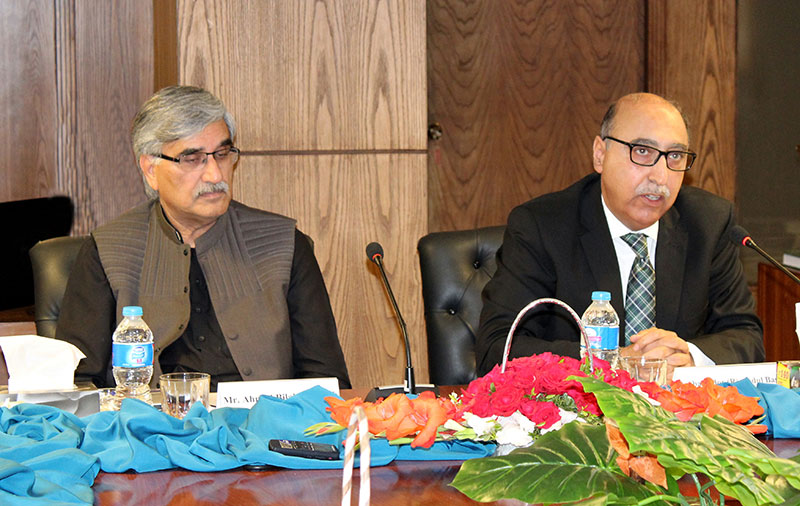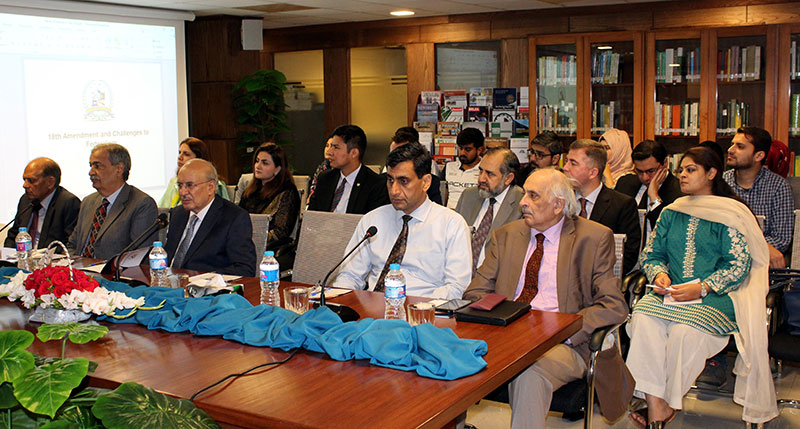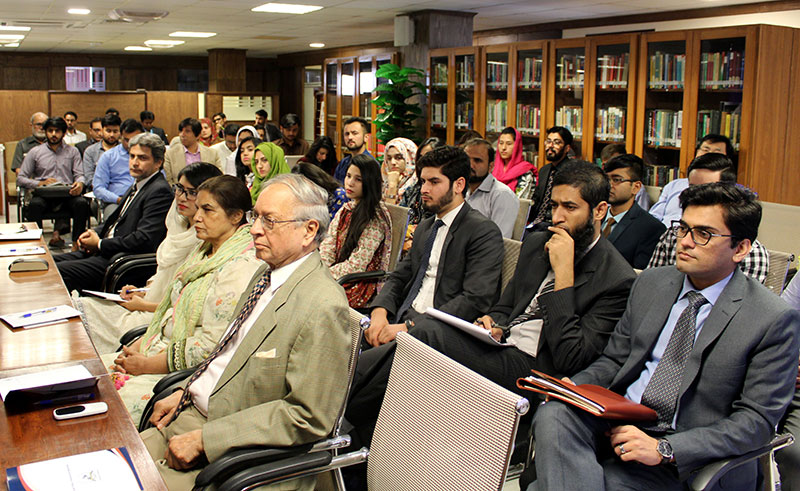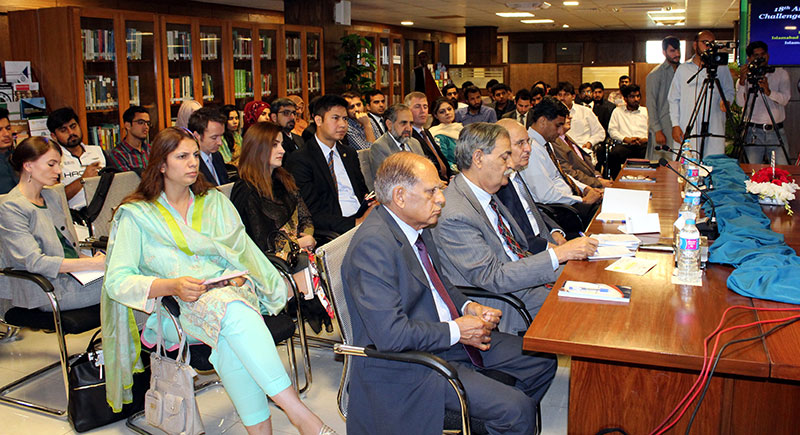Guest Lecture 25/04/2018
Post-event Report
One-day Guest Lecture
On
“18th Amendment and Challenges to Federalism in Pakistan”
Introduction
Islamabad Policy Research Institute (IPRI) organized a “Guest Lecture” on “18th Amendment and Challenges to Federalism” on April 11, 2018 at IPRI Conference Hall. Mr. Ahmed Bilal Mehboob, President PILDAT spoke on the occasion to underscore that federalism is a political arrangement for the purpose of facilitating different identities as well as national cohesion. He further underlined that the key determining factors are geography, Culture, Language and level of development for improving federalism.
Summary
- Federalism was introduced in the Sub-Continent in form of Lucknow Pact 1916, which provided provincial autonomy to the provinces.
- Federalism before the partition was entirely different from the federalism at present.
- Pre-1970 federalism was implemented between two different sides, the East and West wing of Pakistan.
- In the post-1970, the problems of management of provinces became difficult due to number of provinces and parity between different provinces in terms of development.
- The relationship between centre and provinces remained strained, especially in the case of Balochistan and NWFP.
- The main objective of the 10th amendment was to increase the power of the parliament.
- The 18th Amendment aimed to strengthen the democratic culture of Pakistan by providing more power to elected representatives.
- The abolishment of the concurrent list led to weakened federalism as Council of Common Interest (CCI) became government within the government. This, in turn, emboldened the differences between centre and provinces.
- The formation of Parliamentary Committee on Constitutional Reforms (PCCR) led to more problems rather than resolving issues within the federalism.
- Ahmed Bilal Mehboob criticized the formation of a committee for 18th Amendment that was dominated by senators who nurtured regionalism.
- Ambassador (R) Abdul Basit, President IPRI laid stress on increasing the coordination between provinces and the federal government.
- The decentralization of power is needed for accommodating the different provincial identities under one common identity of a strong federation.
- Democracy in Pakistan has developed through the 18th Amendment as it has empowered parliament in the country.
- The role of the Election commission of Pakistan has contributed in holding election as well as election of the local bodies at the grassroots level.
- The power of the President of Pakistan is limited to a ceremonial head, which limits the power to change the constitution of Pakistan.
- The abolishment of 58-2b has strengthened the democratic norms in Pakistan.
- During the question and answer session, participants raised questions regarding alternatives of objective discussion on legislation as there is a continuous pattern that ruling government have mostly led in terms of giving up any debate on legislations as well as in the capacity of public or the parliamentary committees. Mr. Mehboob responded to the question by explaining that The Pakistan Institute of Parliamentary Services is dedicated to focus on the performance monitoring of parliament and provincial assemblies. Unfortunately, it has been noticed that the members of parliament do not pay much attention to the legislation.
- While explaining the carelessness of parliament members towards legislation, Mr. Mehboob stressed upon the fact that the voters are focused more on gaining personal leverages from the parliamentarians and do not hold them accountable for their actions.
- Mehboob further referred to the Electoral Act 2017 that was recently passed in which few of the nomination forms were amended. However, due to the agitation and protest, the amendment was revised in days. He explained that it’s the harsh reality that most of the parliamentarians were not familiar with the amendment even it remained on the website for months. The process of such ignorance by the parliamentarians can be tackled when common voters will hold them accountable for the work done in the parliament.
Conclusion/Recommendations
- In a discussion session, it was also highlighted that those who approved the 18th Amendment despite being in control of all provincial matters, are not willing to devolve or share power and resources down the line with their own people.
- The centralization of powers at the provincial level is not in line with the spirit of the 18th amendment. It is imperative to provide autonomy to the provinces because strong and effective provincial governments result strong federal governments.
- Pakistan can harness the outcomes of federalism by debating the merits and demerits of various amendments and challenges to federalism on a regular basis.
- Resolution of the points of divergence between provinces can be accomplished through the channel of a reformed Council of Common Interest as well as formulating a committee to review the outcomes of the 18th
- The restructuring of the Council of Common Interest should be based on equal participation, which will promote federalism rather regionalism in Pakistan.
- The devolution of power can become more effective in addressing the concerns of the centre and provinces.
- The challenges to federalism can be addressed by assessing the economic, political and legal aspects of the 18th Amendment separately.
- There is a need for open debates on 18th amendment in order to address the challenges of this amendment.
- All the challenges of the 18th amendment can be resolved by bringing the required reforms in the system. Respective policy makers, public officials, journalists, civil society representatives, and citizens should be educated on the contours of 18th constitutional amendment.
- Furthermore, a committee consisting of legislative experts, parliamentarians, and practitioners should be constituted to study the 18th Constitutional Amendment.
- In addition, formal consultation process should be initiated where input from respective communities and other stakeholders should be solicited and documented.
- The capacity of the political representative and higher public officials should be built; the federal government should prepare modules and booklets that may serve as reference points for the public officials and policymakers alike.
- Without giving due rights and devolving the power to provinces, there can never be a strong federation. Challenges facing devolution include lack of awareness about Local Government, inadequate resources to support the effective implementation of devolution, lack of accountability and lack of political will to strengthen the grass roots level of democracy and lack of a common understanding of the roles of the different institutions involved in the implementation.
- All these challenges can be resolved by bringing the required reforms in the system. Respective policy makers, public officials, journalists, civil society representatives, and citizens should be educated on the contours of 18th constitutional amendment.
Disclaimer: Views expressed are of the speakers and are not necessarily reflective of IPRI policy.




